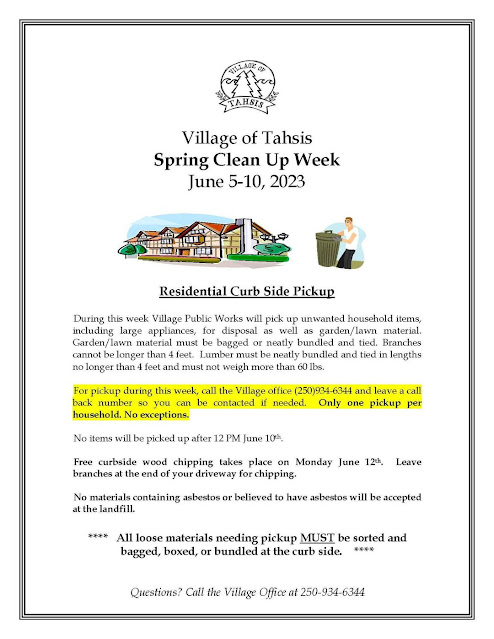Tahsis is a remote village on the west coast of Vancouver Island. With only 400 residents, we don't have many of the conveniences of larger towns but we do have community spirit and lots to do in our spectacularly wild and beautiful environment.
Wednesday, 31 May 2023
Monday, 29 May 2023
Sunday, 28 May 2023
Saturday, 27 May 2023
Friday, 26 May 2023
Sunday, 21 May 2023
Public asked to remove bird feeders
BC SPCA asks public to remove bird feeders due to avian influenza outbreak
The rise of highly pathogenic avian influenza (HPAI) in B.C. has yet to show any signs of slowing down. Positive cases have been confirmed in the Lower Mainland, Vancouver Island, Interior and North regions. This includes birds like great horned owls, bald eagles, great blue herons, ducks and geese, and even crows.
During this fall migration season, birds gathering in large groups can be problematic for the spread of HPAI – an effect that is particularly apparent for snow geese in the Richmond and Delta area.
“The number of confirmed positive cases is just the very tip of the iceberg,” says Andrea Wallace, manager, wild animal welfare, “The number of suspected cases – alive or deceased – far exceeds the capacity to test the animals. In addition, many animals that pass away in the wild are never recovered.”
The BC SPCA is continuing to advise the temporary removal of seed and suet bird feeders to help discourage unnecessary large gatherings that may facilitate the spread of the disease.
Which animals are affected?
Although waterfowl (including ducks, geese and gulls) and raptors (eagles, hawks and owls) are highest risk, avian influenza viruses can infect all avian species. Wild birds, especially waterfowl, are natural reservoirs of influenza viruses. They are not normally affected by the disease, but can still transmit it to other birds. The H5N1 strain is considered highly pathogenic, causing severe illness and death in birds.
Pet birds can also be infected by avian influenza, and HPAI has been detected in mammals including rats, mice, weasels, ferrets, pigs, cats and dogs.
In Canada, B.C. is second only to Alberta for the highest number of birds affected at poultry farms, resulting in mass mortality.
How does the virus spread?
The virus is shed by infected birds through feces and respiratory secretions and is very resilient – the virus can survive in the environment for several months and continue to infect other birds. HPAI may also persist on clothing and footwear creating further transmission risk. If you visit an area where birds congregate or are in contact with wild birds, be sure to clean and disinfect your footwear and wash your clothing thoroughly.
Bird feeders facilitate the spread of the disease by encouraging unnatural congregations of birds and attracting other wildlife including predators and rodents. Fallen seed is also an especially bad source of disease – when birds feed from the ground, they are also exposed to droppings that accumulate below a feeder. The presence of bird feeders and baths can also increase the risk of transmitting the virus between nearby animals like backyard chickens or turkeys. Do not keep bird feeders or create duck ponds close to poultry barns – this will attract wild birds and create more opportunities for disease transmission.
If you see a sick bird
Sick birds may appear lethargic, unusually “fluffed up”, have nasal discharge, coughing and/or sneezing, diarrhea, or have excessively watery eyes or swelling of the head, neck and eyes. Contact the BC SPCA at 1-855-622-7722 for advice about sick birds or for help finding your local wildlife rehabilitation centre.
Report sightings of sick or dead wild birds to the B.C. Wild Bird Mortality Investigation Protocol & Avian Influenza Surveillance Program (PDF) at 1-866-431-BIRD (2473). If the report is assessed to require further investigation, guidance will be provided on a case by case basis. Please do not bring deceased birds to a wildlife rehabilitation centre or veterinary clinic as they will not be able to test for the disease.
Resources:
- B.C. Wildlife Health
- Dashboard: Highly pathogenic avian influenza – wild birds
- Map: Avian influenza zones
- Fact sheet: Avian influenza
- Precautions for bird banders, Aviculturists and wildlife rehabilitation centres
- Government of Canada – status of ongoing H5N1 response
More information on bird feeders
Help curb this serious disease by removing your bird feeders and emptying bird baths as well as monitoring for any signs of sick birds in your area. Outside of disease outbreaks, the BC SPCA generally recommends only providing bird feeders in winter between October and March. In the spring and summer months, there is lots of natural food for birds. Get the facts on backyard bird feeding.
What about hummingbird feeders?
Hummingbird feeders are not without risk but pose the lowest risk because they are species-specific and have a more limited group of birds visiting them. However, this is a good reminder to regularly change the nectar in and clean hummingbird feeders to prevent deadly fungal outbreaks. Learn how and when to change the hummingbird nectar solution, how to clean your hummingbird feeder, and how to keep hummingbirds safe in winter. And remember, if you see sick birds at your feeder, take it down right away!
Friday, 19 May 2023
Wednesday, 17 May 2023
Latch those garbage cans
We are witnessing bears eating garbage from the curbside containers that are not being closed and latched. We are placing notices on the containers and installing barrel locks. The notices contain a warning that bears eating garbage from unlocked and/or unlatched containers will result in those containers being removed. The number of incidents of bears eating garbage last summer fell significantly when the curbside containers that attracted bears were removed.
Tuesday, 16 May 2023
Fire ban
Open fire prohibition scheduled for Coastal Fire Centre
PARKSVILLE – Effective at noon Pacific Daylight Time on Thursday, May 18, 2023, most open burning activities will be prohibited throughout the Coastal Fire Centre’s jurisdiction. This prohibition is being enacted to help reduce wildfire risk and protect public safety.
Category 2 and Category 3 open fires will be prohibited throughout the Coastal Fire Centre’s jurisdiction, with the exception of Haida Gwaii. This prohibition will be in place until October 31, 2023, or until the order is rescinded.
A map of the affected area is available here.
This prohibition applies to all public and private land, unless specified otherwise (e.g., in a local government bylaw). People are asked to check with local government authorities for any other restrictions before lighting any fire.
Specifically, this prohibition refers to the following activities:
“category 2 open fire” which means an open fire, other than a category 1 campfire, that
- burns material in one pile not exceeding 2 m in height and 3 m in width,
- burns material concurrently in 2 piles each not exceeding 2 m in height and 3 m in width, or
- burns stubble or grass over an area that does not exceed 0.2 ha.
“category 3 open fire” which means an open fire that burns
- material concurrently in 3 or more piles each not exceeding 2 m in height and 3 m in width,
- material in one or more piles each exceeding 2 m in height or 3 m in width,
- one or more windrows, each not exceeding 200 m in length or 15 m in width,
- stubble or grass over an area exceeding 0.2 ha.
Also prohibited are the activities listed below (Wildfire Act, Section 12):
- Fireworks;
- Sky lanterns;
- Binary exploding targets;
- Burn barrels or burn cages of any size or description; and,
- Air curtain burners.
This prohibition does not apply to Category 1 open fires (campfires) that are a half-metre high by a half-metre wide or smaller, or to cooking stoves that use gas, propane, or briquettes.
Anyone lighting a campfire must maintain a fireguard by removing flammable debris from around the campfire area and have a hand tool or at least eight litres of water available nearby to properly extinguish the fire.
The Coastal Fire Centre covers all the area west of the height of land on the Coast Mountain Range from the U.S.-Canada border at Manning Park, including Tweedsmuir South Provincial Park in the north, the Sunshine Coast, the Lower Mainland, Vancouver Island, the Gulf Islands and Haida Gwaii.
Anyone found in contravention of an open fire prohibition may be issued a violation ticket for $1,150, required to pay an administrative penalty of up to $10,000 or, if convicted in court, fined up to $100,000 and/or sentenced to one year in jail. If the contravention causes or contributes to a wildfire, the person responsible may be ordered to pay all firefighting and associated costs.
To report a wildfire, unattended campfire, or open fire violation, call 1 800 663-5555 toll-free or *5555 on a cell phone. For the latest information on current wildfire activity, burning restrictions, road closures and air quality advisories, go to: http://www.bcwildfire.ca
Follow the latest wildfire news
- on the free BC Wildfire Service public mobile app, available for Apple (iOS) and Android devices
- on Twitter: https://twitter.com/BCGovFireInfo
- on Facebook: http://facebook.com/BCForestFireInfo
Contact:
Fire Information Officer
Coastal Fire Centre
BC Wildfire Service
250 951-4209
Monday, 15 May 2023
Mascon planned network maintenance and service outage
|
|
Friday, 12 May 2023
Thursday, 11 May 2023
Tuesday, 9 May 2023
Monday, 8 May 2023
BC wildfire situation information
Message from Mark T.
As we move into the traditional wildfire season, thought it would helpful to share the Province’s wildfire situation website which displays all active wildfires province-wide in map and list form and ratings (e.g., out of control, contained.). It also contains current statistics and wildfire resources.
The website also includes:
- evacuations, orders and alerts;
- area restrictions
- bans and prohibitions
- smoke forecast
- danger ratings
- local authorities; and
- road conditions
Here’s the link
BC Wildfire Service (gov.bc.ca)
There is an app as well (BC Wildfire Service) on the Apple App Store and Google Play.
Friday, 5 May 2023
Thursday, 4 May 2023
Books for babies
Message from Tahsis library -
Tahsis Parents: we have 'Books for Babies' bags available at the Tahsis Library. Each bag contains a book, a music cd and some fun ideas for early literacy at home. These are free and available at your library. I will also bring some to the Seniors' Night Market on Friday, May 5th.
Wednesday, 3 May 2023
Tech help at the library
Matthew is coming in next Wed., May 10. Need help with your device? Call 250-934-6621 to book a time.
Sunday afternoon concert


















